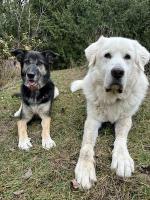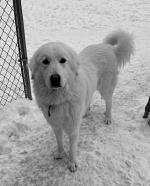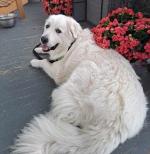Marshmellow

Marshmellow is fitting in beautifully in with his new family. His leash walking has improved immensely.
He will get into the van but not the car but with a little patience, it will happen eventually.
This was his story:
This beautiful boy is three years old.
He was surrendered because the autistic teenager with whom he lived was very rough with him and it was getting difficult for Marshmellow to handle. He was good with the younger children.
He is good with other dogs but if another dog is in the home, it needs to be female.
In short, here are some of the things to be expected from a Pyr:
They are beautiful dogs with great temperaments given the right breeding, socialization, care including diet and training.
They require a good weekly grooming to keep them mat free and their skin healthy (hence, pain free from the pulling of mats as they move), and cutting their nails including their dew claws every couple of weeks to a month.They molt twice a year and all year round so your vacuum stays full. NEVER shave a Pyr. Their double coats keep them cool in summer and warm in winter. If you don't like grooming, take your dog to a master groomer.
Their instinct it to wander. Therefore, they require at least a 5-foot secure fence in a large yard in which they can play, run and watch over. No tie outs for these guys. It can lead to aggression since they cannot fully watch over their territory. If they are out all day, as they usually prefer, they need shelter from the elements.
They bark more than most dogs and neighbours do complain. That is a common reason for people surrendering their Pyrs (they didn't do their research). Their bark is what deters predators and it is instinct to them. That and marking their territory. To take away their bark is to take away who they are. The barking can be managed but it takes time, patience and consistency with positive-reinforcement training. If you don't like barking, they are not the dog for you.
They dig holes in your garden to stay cool in summer.
They require a lot of socialization as pups onward with people and other dogs. They also require positive-reinforcement training (a trainer who shows you how to work with a clicker). Pyrs, nor any dogs, take kindly to any kind of punishment or force. It will lead to aggression. Dr. Sophia Yin is a great website resource.
It's important to work with the dogs as if in a dance and you are leading. Rewards for good behaviour and redirect for unwanted behaviour. It's up to you to make them a good canine citizen. When engaging a trainer, ensure they use positive-reinforcement training and show you how to manage your dog. Never send a dog away for training. You are the one working with the dog, not a trainer.
To train a Pyr is not like training some other dogs. They are not eager-to-please and just as soon walk away from you than do as you say. They were bred by man to be used as guardian livestock dogs because they do not require human intervention to tell them how to do their job. Lots of patience, consistency and time is required to work with them. If you want an obedient dog, this is not the dog for you.
They require regular walks, of course, so they get out and see the world. They must be leashed because they will wander. Again, because they are so good at wandering they have been used to wander with sheep as they watch over them. It's suggested to use a front lead harness which will cut down on any damage to the spine should the dog pull although, with a little work from puppyhood, they should be good on a leash.
There are those in need of a home because someone didn't realize they would get so big, bark so much, leave so much hair in the house, wander, and require work amongst other reasons.
It is very important to do your research on any breed before deciding if they are a good match for your family. Please start here:
The Great Pyrenees
Regarding dogs and children. We never want to see these dogs fail so it's important that children learn how to behave with dogs and that parents never leave their children alone with a dog. Here is a link on that subject:
Dogs and Children
If you are interested in meeting him, please contact Dr. Carol Graham at 519.853.3005 or 519.855.6439. Leave a message and she will return your call.
If you would like to meet Marshmellow, please fill out an adoption application.
There is a $350 adoption donation. This helps to cover costs associated to dogs in our care.
Return to Post A Happy Tail 2016.
Breaking News
-
Courtesy - Bear
Apr 09, 25 09:09 AM
Bear DOB: October 2018 Location: Midland, Ontario Pyr/Maremma? mix Single family home with a large securely-fenced property or a hobby farm. Purchased/adopted -
Courtesy Post - Willow
Apr 09, 25 09:07 AM
DOB: March 26th, 2022 Location: London Ontario Cross Pyr/Collie Obtained her privately through a friend. How long have you had her? 10 months Spayed -
Lucy
Apr 09, 25 09:06 AM
*Foster-to-Adopt* or *Foster* DOB: January 3, 2024 Location: Acton, Ontario She will need a single-family home with a securely fenced yard of at least -
Remi
Apr 09, 25 07:44 AM
Location: Acton, Ontario DOB: February 2024 This sweet white fluffy Remi has a sad story. Remi, while his family was in the midst of moving, escaped and -
Grieving Dog
Apr 04, 25 06:17 PM
Background: I am seeking some feedback if anyone has had experience with bonded pairs. Thank you! We have been fortunate to love 2 x almost 10 year -
Leo
Mar 12, 25 06:32 AM
*ADOPTED* DOB: September 2023 (almost 1.5-years-old) Location: Acton, ON Single family home with a securely fenced yard required. This sweetheart was -
Buster
Mar 10, 25 03:36 PM
*Buster is going back to his original family as things have brightened up in their lives and he'll have a wonderful life on acreage.* Buster had to come -
Courtesy - Maya
Jan 08, 25 05:35 PM
*ADOPTED* Location: Dunnville, ON DOB: Jan. 3, 2021 (3.5 years) Spayed Companion Dog, Pyr mix Good with children. Single family home. Raw diet (species-appropriate)














